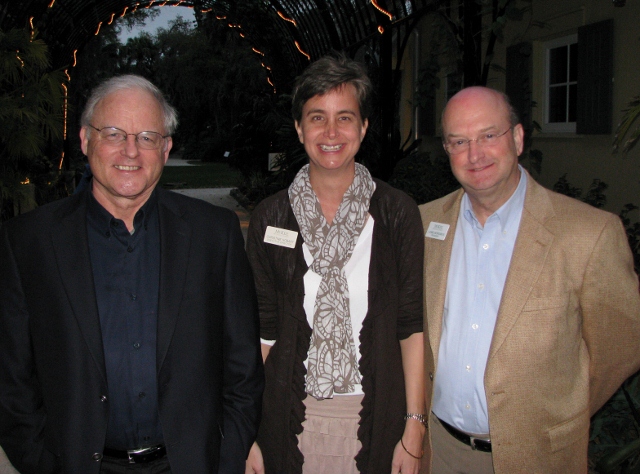
VERO BEACH — McKee Botanical Garden’s verdant enclave of tropical wonder was the picture-perfect setting for a pair of lectures by New York Times best-selling author Richard Louv, who wrote the Last Child in the Woods, named 2008 Audubon Book of the Year, and its follow-up book, The Nature Principle.
Earl Morgan, McKee Botanical Garden board president and one of its most enthusiastic advocates, read the books last year and formulated the idea to invite Louv to speak. In his books, Louv addressed what he has coined “nature deficit disorder,” the issue of children spending too much time engrossed in technology, and the health advantages of reconnecting with nature.
Earlier on Saturday Louv spoke to about 90 people, including a good number of educators and mental health professionals, at a late breakfast. The evening event drew another 75 McKee supporters for an intimate dinner engagement, and the launch of the new Garden Discovery Backpack program.
After cocktails in the outdoor Spanish Kitchen, guests filtered indoors to dine in the magnificent Hall of Giants at the world’s largest mahogany table.
“It’s a very special evening,” said Christine Hobart, McKee’s executive director, who also happened to be celebrating her birthday.
“He stayed for over an hour answering questions,” said Hobart of the morning engagement. “They were intrigued by what he had to say and his passion for setting people on the track to nature.”
Louv was equally impressed with McKee and astonished when told that just a short time ago it had been on the verge of being plowed under.
“Gosh it’s beautiful; it’s great,” said Louv. “I can see why people like to come here to meditate.”
Several at the evening event had also attended the morning session, including Alma Lee Loy, McKee’s first board president, and Indian River County School Board member Carol Johnson.
“He has a message I have not heard before,” said Loy. “It’s powerful, it’s truthful and it’s something we all need to pay attention to. There’s something everyone can do to help stem the tide and teach our children about nature.”
“They just seemed to eat it up,” said Johnson, noting how enthralled the educators were with his presentation. “And he was very impressed with them, staying long after his talk was over. McKee provides such phenomenal learning opportunities year round.”
Creativity has abounded over the last decade, as Hobart and her board strive to entice members of the community to commune with nature with exhibits that have featured gargantuan bugs and life-sized dinosaurs, the enchanting Fäbel glass collection, delightful Dr. Seuss characters, a fanciful Fairy Festival, fabulous water lilies, Halloween scarecrows, festive holiday decorations and the current Sculpting Nature Exhibition.
The latest Garden Discovery Backpacks program, features backpacks filled with age-appropriate themed program materials and observation tools. Created by Lucie Burke and Pam Schlamowitz, the backpacks are designed to enhance a child’s visit to the garden and record their real-life adventure in a personal journal which they can take home.
“In England I found there is a true effort to have mental health physicians encourage contact with nature,” said Louv, who maintains in his books that by living in nature, we can boost mental acuity, creativity, health and wellness.
Dr. Wayne Creelman, medical director at the University of Florida Center for Psychiatry & Addiction Medicine, agreed saying, “The benefits of nature are sometimes just as beneficial as a prescription.”



